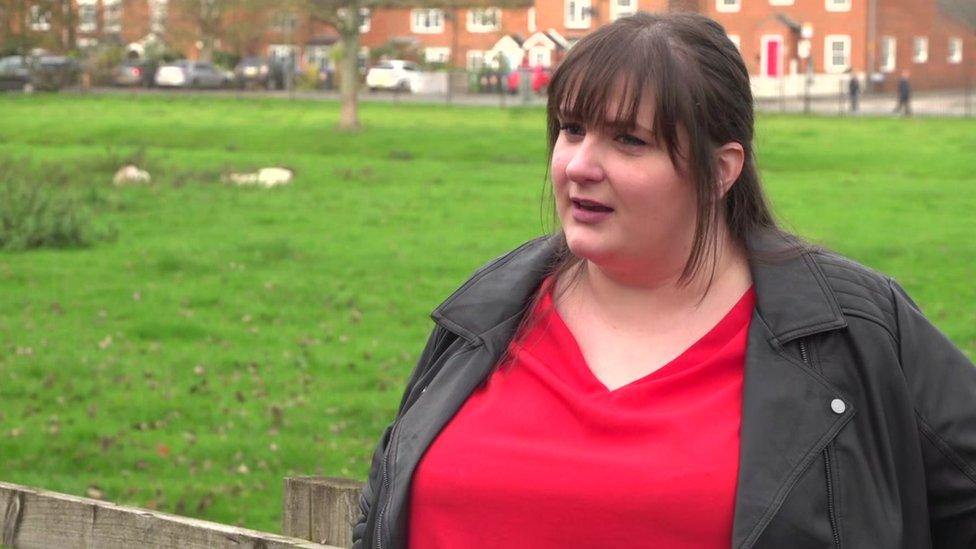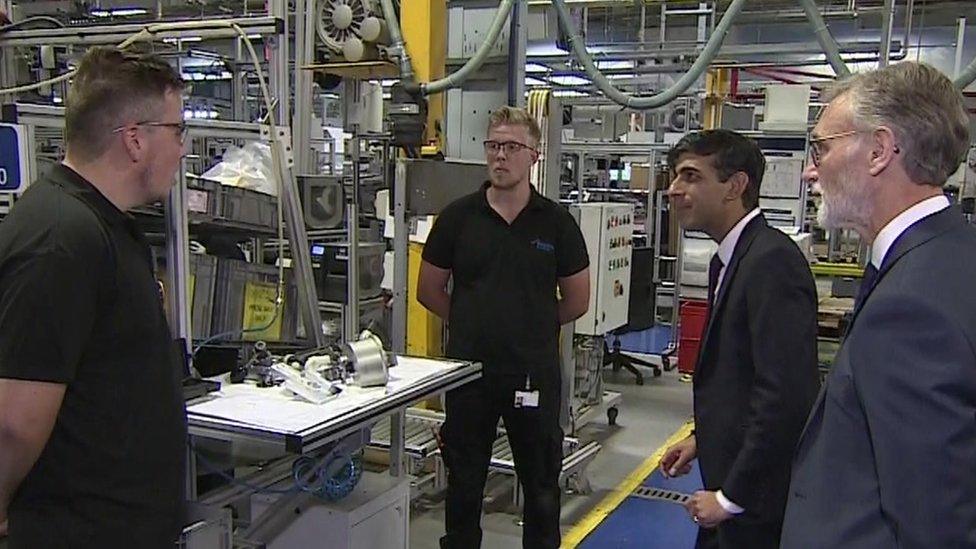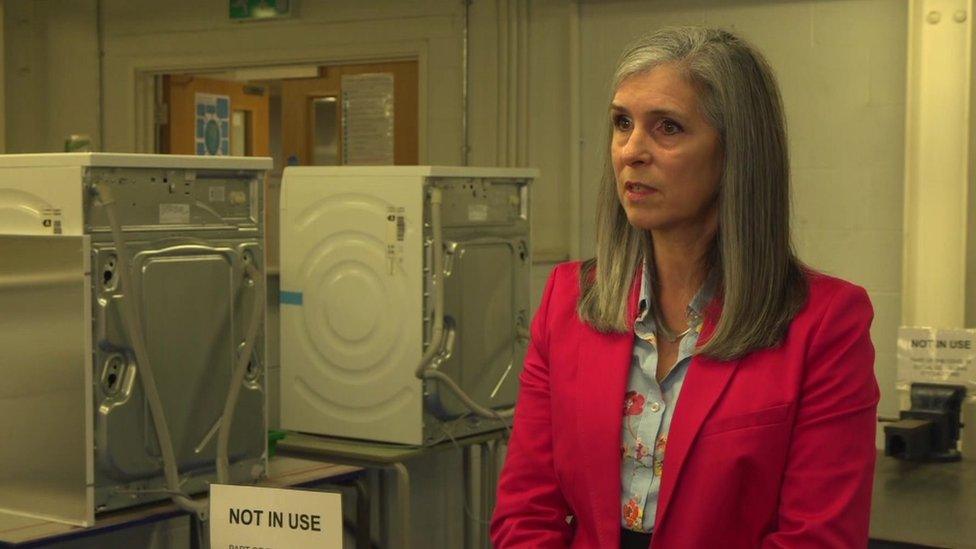Apprentice redundancy numbers rise: 'I was devastated'
- Published

Louise has found new work on a farm - but her apprenticeship is over
Louise James started her apprenticeship with a butchery company in January, but was made redundant just eight months later due to the coronavirus pandemic.
The 33-year-old was "devastated" by the decision, but her employer's business had completely dried up.
Louise is not alone, with the number of apprenticeships ending in redundancy in lockdown two thirds higher than in 2019, provisional figures show.
The BBC obtained the data under the Freedom of Information Act.
Between March and July, 1,033 people in England were withdrawn from apprenticeship programmes because they had been made redundant.
This compares to 615 for the same period in 2019, according to Education and Skills Funding Agency (ESFA) data.
There are roughly 740,000 apprentices training in England in total.
The apparent rise in redundancies is more evidence of the challenge facing the apprenticeship system due to the coronavirus outbreak.
The ESFA said the total number of apprentices made redundant would be higher than the figures they disclosed.
The numbers don't include those who go on to complete their apprenticeship with a new employer, or at a college.
Some cases may also not be registered as redundancies, the agency said.
More substantial data is expected later in November.

'Devastated'
Louise said she had wanted to be a butcher since she was "tiny".
"I have never been the sort of person to want to sit behind a computer screen all day. I always like doing things with my hands, I am very crafty. I felt worth something."
But her employer provided meat to bars and restaurants - when they closed, business dried up.
"We went from having something in the region of about a thousand orders a day to having 30 and there just wasn't enough work to keep all of the staff on."

Louise was told she was being made redundant, and says she was "devastated."
The government was already supporting trainees for 12 weeks to find new work and continue their apprenticeship, but Louise didn't have much luck.
"I contacted something in the region of 30 butchers across Coventry and Warwickshire. There were three who seemed quite keen and then once they realised I was over the age of 21 they cooled off."
"I didn't receive much support from the training company at all. I have not even received confirmation that my apprenticeship has come to an end. I just know that it has due to the length of time it has been."
In August, Louise's redundancy went through, and she's since found work on a council-run farm, supporting adults with learning disabilities.
"It was a huge relief. I cried, I'm not going to lie. It has been a very financially difficult year for myself and my husband. I cried. And we celebrated as well!"


The Chancellor's furlough scheme was opened to apprentices from the start of lockdown
In October, 12% of apprentices in Great Britain surveyed by the Sutton Trust had been made redundant, up from 8% in April.
A further 8% were on furlough, and 35% had been furloughed but were now back at work. 15% had remained at work but seen their off-the-job learning programmes suspended.
For the UK workforce as a whole, July to September saw a record increase and a record number of redundancies, to 314,000, according to official statistics.
What is government doing to help apprentices?
Gillian Keegan, apprenticeships minister, told the BBC that redundancy "is always a risk when you have got this sort of disruption in your economy so we were very focused very early on to do as much as we could to support and protect apprentices."
That support includes allowing apprentices to be furloughed, and continue their training while not working, moving to online study if need be.
From August to January, employers will get a £2,000 grant for each apprentice under 25 they hire, and £1,500 for older apprentices.
In September, the government introduced a redundancy support service for apprentices.
At the same time, trainees who were three quarters of the way through a longer apprenticeship were granted funding to finish - previously, this had been limited to those in their final six months of training.
Fewer opportunities?
The pandemic has also hit the number of people starting new apprenticeships.
Figures from the Department for Education show , externalthat between 23 March and 31 July in England, 58,160 apprentices started their training - down from 107,750 during the same period in 2019.
Apprenticeships for the under-19s were particularly affected, down over two-thirds compared to the same period last year.
The retail and leisure sectors, hardest hit by the lockdown, show a 72% fall.
However, the Department said some of the apparent drop may be exaggerated by employers failing to file paperwork because of the pandemic.
The first five months of lockdown also saw a steep fall in the number of opportunities advertised on the government's Find an Apprenticeship website.

Tracey Matthews says around 20 of Milton Keynes College's 500 apprentices face redundancy
Tracey Matthews, an assistant principal at Milton Keynes College, said the picture was concerning.
"I don't just worry about all those apprentices we have on programme now, I also worry about those young people who wanted to get apprenticeships. We don't have as many vacancies in the system as we have had previously.
Ms Matthews said she worried the uncertainty could damage the "apprenticeship brand".
"For the last few years in school we have been trying to encourage young people to consider apprenticeships as a viable alternative, and now actually, for those who have, maybe they're feeling their fingers have been burned," she said.

In a special edition of the Your Work Your Money podcast, Sean and Reggie are joined by YouTuber and former BAME Apprentice of the Year Kimmy Kimani to answer your questions on apprenticeships. Available now on BBC Sounds.